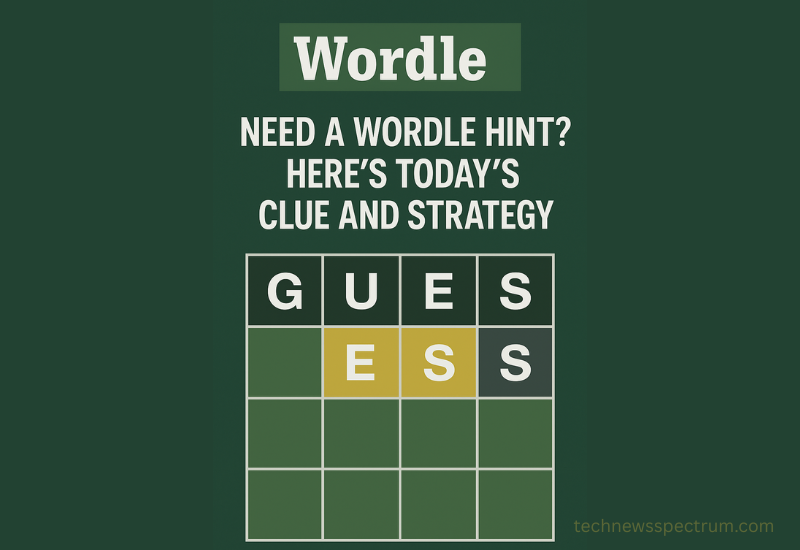Need a Wordle Hint? Here’s Today’s Clue and Strategy
Introduction
Wordle is more than just a puzzle—it’s a daily ritual for millions. Whether you’re trying it during your morning coffee or squeezing it into your lunch break, the five-letter guessing game has taken over timelines and conversations alike. Since being featured on platforms like the New York Times Wordle page and NYTimes Wordle, it’s become a go-to brain teaser for both casual players and serious wordsmiths.
Some players enjoy solving the puzzle with no help at all. Others look for that little nudge that helps them avoid guessing in the dark. That’s where a timely Wordle hint can make all the difference. Whether you’re chasing a win streak or just aiming to crack today’s puzzle without burning all your guesses, a subtle clue can be the edge you need.
This post brings you exactly that: a Wordle hint today, with a focus on clarity, fair challenge, and keeping the experience fun. You’ll find a clue that respects the thrill of the game, along with practical thinking strategies to sharpen your next guess. We’ll also break down common tactics that experienced players use when they open up the puzzle—whether on Wordle NYT, Wordle of the Day, or updates like Wordle hint today Newsweek shares regularly.
Whether you’re new to the game or you’ve been following Newsweek Wordle hint today for a while, this post gives you tools to think smarter, not harder. Let’s get into today’s clue and how to use it without spoiling the fun.
Background Information
Wordle began as a simple word-guessing game created by software engineer Josh Wardle for his partner. What started as a quiet project quickly gained traction through word of mouth and social sharing. The basic idea behind the game is straightforward—players have six tries to guess a five-letter word, with feedback after each attempt. Letters that are in the correct position turn green, letters that are in the word but in the wrong spot turn yellow, and incorrect letters are greyed out. This simple format is easy to grasp but encourages thoughtful guessing and pattern recognition.
The game’s appeal grew rapidly in late 2021 and early 2022, reaching a point where it became a daily highlight for millions. Its rise was further solidified when the New York Times Wordle acquisition introduced it to a broader global audience. Since then, Wordle NYT, also referred to as NYTimes Wordle, has kept the daily puzzle consistent and ad-free, making it a staple of morning routines and social feeds.
Each day’s challenge is the same for every player, which helps fuel community engagement. Social media platforms often fill with posts where users share their attempts without revealing the answer, using the now-iconic grid of green, yellow, and grey squares. This shared experience helps maintain excitement, while the simplicity of the format keeps the barrier to entry low.
The term Wordle of the Day has become common in online discussions, forums, and even search trends. Many users who play daily now look for ways to enhance their performance without compromising the fun. That’s where a wordle hint can play a useful role. It offers just enough support to steer a player in the right direction—especially when they’re stuck early on—but avoids giving away the full answer.
People searching for Wordle hint today or checking outlets like Newsweek Wordle hint today are usually trying to maintain their streak or just get a little boost. While spoilers can ruin the puzzle’s appeal, a carefully crafted clue helps keep the spirit of the game alive. These hints are often shared in newsletters, Wordle communities, and pages like Wordle hint today Newsweek or Wordle hint Newsweek, where players can get subtle guidance without the satisfaction of discovery being taken away.
The popularity of Wordle also gave rise to variations and copycat games, but the original format continues to lead. What keeps it fresh is the daily rotation—there’s no archive mode in the current NYTimes Wordle, so you only get one chance each day. This limited play creates anticipation and adds to the ritual-like nature of checking in daily. Players often talk about the pressure of solving it before seeing spoilers online, which increases the demand for a non-revealing wordle hint that can assist while keeping the challenge intact.
As players become more invested, patterns and tactics start to matter more. Some begin with common starter words. Others use elimination strategies. But even the most seasoned players sometimes turn to a wordle hint to push through tricky letter combinations or less familiar vocabulary. It’s not about shortcuts—it’s about improving accuracy and maintaining enjoyment.
With this in mind, today’s puzzle hint is crafted to help players think more strategically. If you’re scanning the latest Wordle hint today Newsweek or simply looking to approach the Wordle of the Day with a better strategy, the next section will give you the clues and mindset needed to play smarter—without taking away the reward of solving it on your own.
Detailed Explanation
Wordle works on a deceptively simple principle: guess a five-letter word in six tries or less. But beneath this surface lies a fascinating psychological process involving memory, deduction, and strategic thinking. Whether you play the New York Times Wordle daily or check Newsweek Wordle hint today, there’s often more mental energy involved than expected.
The guessing process starts with what’s known as a “starter word.” This first attempt is a foundation—it reveals nothing yet gives the brain a chance to begin forming patterns. Many players aim for words that include common vowels and frequently used consonants. Think of options like “CRANE,” “SLATE,” or “ADIEU.” These words help test a mix of vowels and consonants quickly.
The goal is to extract useful feedback from that first move. In Wordle NYT, green tiles confirm a correct letter in the correct position. Yellow means the letter is in the word but not in that spot. Grey indicates it’s not part of the answer at all. This color system acts as a code: with each guess, your job is to decode the word using what you’ve learned from previous attempts.
After two or three guesses, patterns often emerge. A well-chosen starting word narrows things down quickly, saving you from wasting attempts on combinations that won’t work. But when you’re stuck with a confusing mix of letters—or no correct letters at all—this is when players search for a wordle hint today to help reframe their strategy.
A wordle hint doesn’t hand over the answer. It nudges you in a direction that might not be obvious. For example, a clue could mention that the word starts with a consonant blend or that it includes a rarely used letter like “Q” or “Z.” This allows players to continue solving while maintaining the satisfaction of finding the word themselves.
For many, the tension of getting stuck creates unnecessary pressure. You might guess impulsively, chasing possibilities that don’t match what you already know. In these cases, using a wordle hint today Newsweek or checking a clue from a trusted source doesn’t take away the fun—it restores it. It’s not about skipping the challenge but making the puzzle feel achievable again.
Color interpretation is where strategy really kicks in. Suppose you guess “SLATE” and get green for “L” and yellow for “A.” You now know “L” is in the second spot and “A” is somewhere else in the word. Your next guess should build around that feedback, trying a word where “L” is second, and “A” appears in a different place. A wrong guess that ignores the feedback from earlier guesses wastes opportunities. Many who play the NYTimes Wordle daily improve their skill by getting better at reading the feedback and adjusting their logic accordingly.
Some players also search terms like wordle hint newsweek or wordle of the day after one or two failed tries. That’s where hint usage matters smart. If you’ve hit a wall and can’t seem to progress, a hint offers a simple nudge to keep momentum. It’s especially helpful when the answer is an unusual or old-fashioned word not used in daily conversation.
There’s also a social element at play. Since everyone faces the same puzzle, people want to stay competitive with friends and avoid spoilers. A small Wordle hint today can keep things fair without removing the fun of solving it on your own terms.
From selecting a solid starter to decoding color clues and knowing when to use a small boost, playing Wordle well combines logic, pattern recognition, and timing. If you’ve found yourself searching for a hint, it likely means you’re invested in improving. With consistent play and the occasional smart nudge, you’ll find the path to solving the puzzle becomes more intuitive.
Examples
Today’s Wordle hint gives a soft push in the right direction without giving anything away. If you’re stuck, here’s a subtle clue: Today’s word begins and ends with a consonant, and it includes one of the least-used vowels. That alone can help shift your thinking toward more unusual options.
Let’s walk through a logical approach. Suppose you begin with the common starter word “SLATE.” Your result shows yellow for “A” and grey for the rest. You now know “A” is in the word but in a different position, and “S,” “L,” “T,” and “E” are not part of the solution.
Your second guess might be “BRAND.” This one shows green for “A” in the third position and yellow for “N.” Now you’re getting closer: “A” is confirmed in the middle, and “N” is in the word but misplaced.
Now try “MANGO.” You hit green for “A” again, grey for “M” and “O,” and yellow for “N” once more. That confirms “N” is still not in the correct spot, but belongs somewhere other than fourth or fifth.
A few more strategic guesses using letters that haven’t been tried—like “H,” “C,” or “Y”—can help complete the puzzle. This kind of approach is what makes the Wordle NYT experience satisfying: each guess becomes a new chance to test logic and narrow the field.
When you hit a wall, searching for a Wordle hint today Newsweek or checking a subtle pointer like the one above doesn’t remove the challenge—it supports smarter play. Many who follow NYTimes Wordle or check the Newsweek Wordle hint today use these clues as part of their strategy to improve daily.
Whether you’re solving or watching others solve, a solid method supported by a timely wordle hint keeps the game fresh and rewarding.
Conclusion
Using a Wordle hint can sharpen your thinking without taking away the fun. Many players rely on subtle clues to keep the challenge alive while improving their guesses over time. Whether it’s your first puzzle or your hundredth, a smart hint can make the difference between a lucky guess and a calculated win.
The daily puzzle format offered by Wordle NYT, also featured in Newsweek Wordle hint today updates, invites regular players to return for new challenges. While some like to guess blindly, others prefer using logic paired with a wordle hint today for better results.
Whether you’re checking the New York Times Wordle or another trusted source, a well-timed wordle hint newsweek can help keep streaks going. And if you’ve found today’s puzzle especially tricky, chances are you’re not alone.
If you’re into improving your strategy or want to share how you approached today’s puzzle, drop your thoughts in the comments. What starter word do you swear by? Did today’s wordle hint help you narrow it down faster? Let’s hear it.
Want to keep your streak alive? Check back daily for a new Wordle hint today that keeps the puzzle challenging but fair. Whether you rely on NYTimes Wordle updates or look for outside strategies, this space brings fresh clues every morning.
Don’t forget to share your score, tips, or even frustrations—Wordle is better when the community plays along.
FAQs
1. What is a Wordle hint and how does it help?
A Wordle hint is a subtle clue that helps guide players toward the correct word without giving it away. It can improve guessing accuracy and make the game more enjoyable without spoiling the challenge.
2. Where can I find the Wordle hint today?
You can find the Wordle hint today on trusted sources like NYTimes Wordle, Newsweek Wordle hint today, or right here on our blog—updated daily to help you stay on track.
3. Is using a Wordle hint considered cheating?
No. Many players view a Wordle hint as a helpful nudge. It allows you to play smarter, especially on days when the Wordle of the day includes less common letters or tricky patterns.
4. What are the best starting words for Wordle?
Words like “CRANE,” “SLATE,” and “AUDIO” are popular among players. A strong start helps reduce guesses and allows you to use any Wordle hint more effectively.
5. Why is Wordle so popular?
The simplicity, daily challenge, and ability to share results have made Wordle, especially Wordle NYT, a daily habit for many. Adding a wordle hint today newsweek keeps the community engaged and competitive.
6. Can I use Wordle hints on older puzzles?
Yes. Reviewing past NYTimes Wordle puzzles with hints can be a good way to improve your strategy and recognize patterns in how words are structured.







